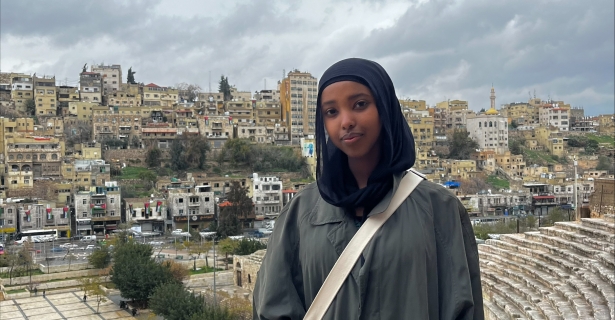Jordan has witnessed an influx of refugees and immigrant settlements from different African groups. According to the UNHCR, there are currently 3,000 Sudanese and 2,000 Somali refugees living in Jordan. However, compared to the nearly 700,000 Syrian refugees, and the 3 million Palestinian refugees, African refugees are often underrepresented and forgotten in conversations about marginalization in refugee groups.
Many Jordanians that I met so far are acquainted with the neighborhoods where African refugees mainly reside but are completely unaware of the larger systems of ethnic-based discrimination that differentiate their experiences from other Syrian, Iraqi, or Palestinian refugees. The passion I have for my topic stems from my proximity to refugee resettlement and immigration as a Somali immigrant in America. Initially pursuing this research topic, I faced many difficulties breaking through surface-level information and outdated statistics on African refugees in Jordan. As the international focus is on larger more immediate groups in Jordan, very few are invested in advocating for equal and progressive rights of all refugee groups. Sawiyan is one of these few organizations that advocate for marginalized African refugee groups.
Early this morning, I met the Co-founder of Sawiyan at a bookstore cafe, where she shared about her initial involvement with the African refugee community after having worked within the Syrian refugee community in the past, along with the growth of Sawiyan as a community rather than a non-profit organization. The Sawiyan team first came together to respond to a mass deportation of Sudanese refugees that happened on December 15, 2018. During this critical time, Sawiyan brought food, blankets, and clothes to the Sudanese community, who were too scared to leave their homes due to the looming threat of deportation. Sawiyan continues to integrate African refugees into the Jordanian community through social inclusion projects that break down stereotypes using dialogue between Jordanians and African refugee communities and provide specialized resources that they currently lack. Additionally, they conduct and support research projects that critically analyze the irrefutable realities faced by African communities, while also solidifying their validity in the NGO world and increasing awareness of their marginalization in Jordanian society.
Jordan has neither created sound national refugee laws nor asylum procedures, as they refused to sign the 1951 UN Refugee Convention nor the 1967 Protection. They did sign, however, a Memorandum of Understanding (MOU) with UNHCR in 1998 where they were given the responsibility of Refugee Status Determination (RSD) that contained the main principles of international refugee protection, and also states that the treatment of refugees and asylum seekers in Jordan should eventually rise to the internationally accepted standard.
To better contextualize what this policy meant for the African refugee experience, I hope to engage with Sudanese and Somali community members during my stay in Jordan. Later this afternoon, I went to Manara Arts and Culture Center to meet with an Adolescent & Youth Development Specialist at UNICEF, who is a member of the Somali community. His family left Somalia over 10 years ago, spending a few years in Yemen and Syria, and settling in Jordan under refugee status, waiting for their final resettlement elsewhere. His story highlights the limited educational and work opportunities for refugees that are exacerbated by anti-Black discrimination. the African refugee experience can take different forms depending on how much the host country is willing to invest in these communities.
These two meetings today further ignited a passion in me to continue learning about the issues of the African refugee community in Jordan through engagement. I now have a clearer picture of Jordan as an overwhelmed state, burdened by the immense needs of its citizens and newly settled refugees. However, Jordan will continue accepting more refugees than it can take care of as long as they receive humanitarian aid from international organizations and donors. Through my research, I hope to highlight the systems that oppress the marginalized African refugee in Jordan and continue to be critical of the different privileges enjoyed by Jordan’s different refugee groups to create a holistic picture of the unique struggles of the African refugee community.

